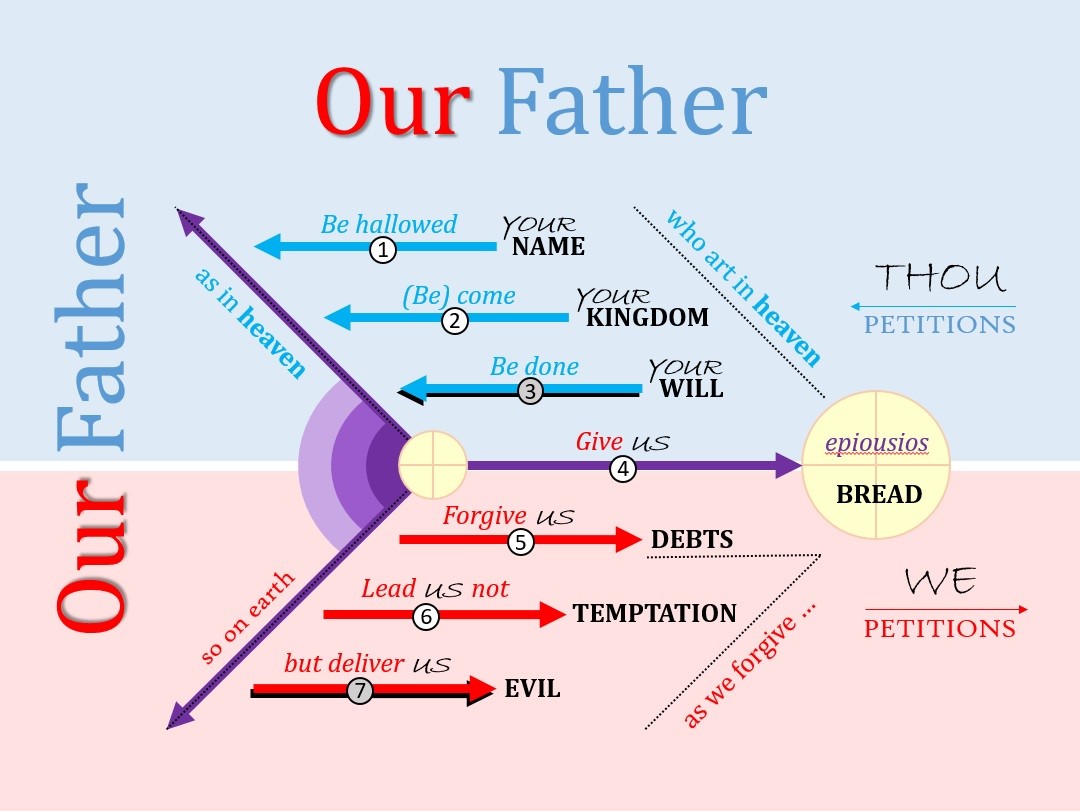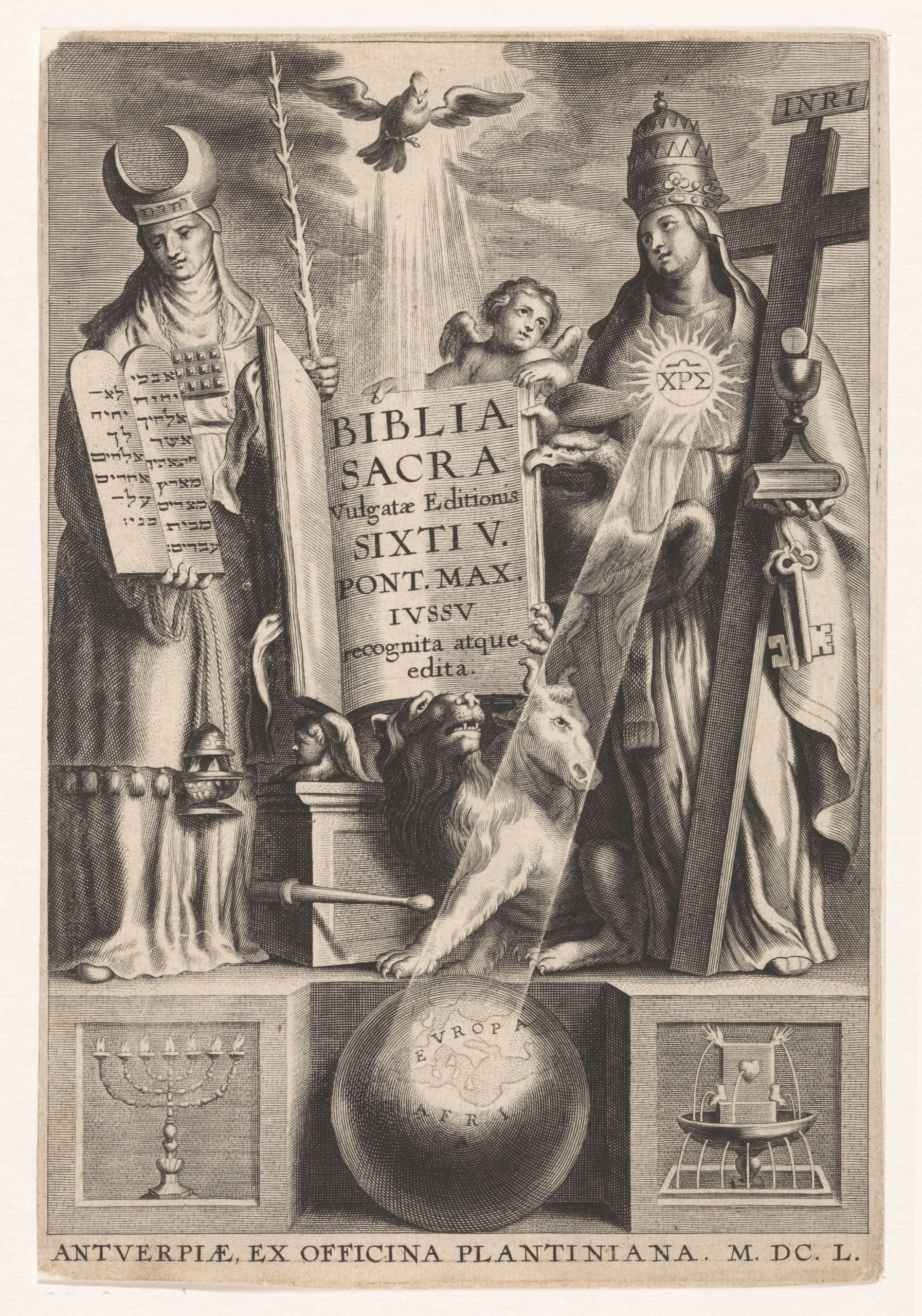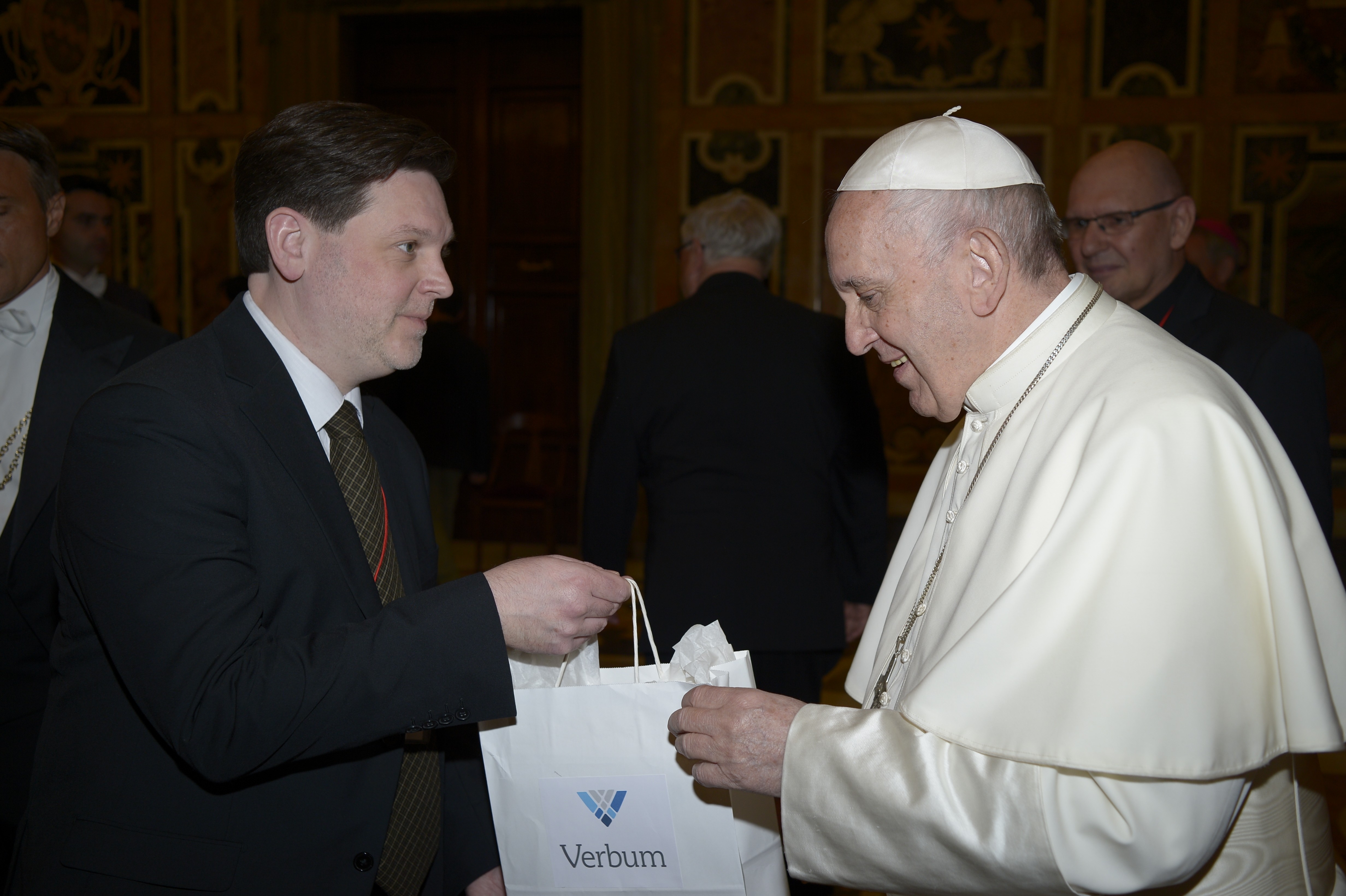A guest post by Fr. Andrew Dalton, LC (andrew.dalton@upra.org).
This is the second of three guest posts in response to both Dr. Mark Ward’s post on the Logos Blog that responded to Pope Francis’s comments on the “lead us not into temptation” petition in the Our Father. Fr. Devin Roza, LC provided some helpful context in a post yesterday. Over the weekend, we will post Part 2.
Pope Francis’ recent comments regarding “lead us not into temptation” have catalyzed a flurry of commentary just in time for Christmas. Dr. Mark Ward’s brilliant article has become one of the most precious presents under my tree. His respectful critique has made me grapple with God’s Word in new ways, and I now stand in deeper awe of it.
In his response to Dr. Ward, Fr. Devin Roza goes beyond the call of duty to contextualize the words of the Holy Father. His treatment is so thorough that it is hard to imagine room for residual doubt—the pope was not bringing a sledgehammer down upon sacred traditions, nor was he tearing Scripture to shreds. He was shining Christ’s light upon the “peripheries of existence.”
As Fr. Roza shows, to interpret papal parlance, context is key. The same principle holds when reading the inspired words of Matthew.
I am slightly concerned that the latest explanations of the sixth petition of the Lord’s Prayer have isolated it from its context. To my mind, most recent commentary gives too little attention to the unity of the Our Father, especially its two “halves” (consisting of three “thou-petitions” and four “we-petitions”), which are best conceived as units. Jesus did not teach us to pray seven disconnected petitions.
Before accusing anyone of atomizing the Our Father, I should probably check my privilege. When I lectured on the Lord’s Prayer at the Pontifical Athenaeum Regina Apostolorum last year, I had the luxury of ten classes (7.5 hours) to comment a 57-word prayer. Still, I found myself short on time—typical professor! No one should expect one essay to do justice to the eloquent architecture and theological profundity of this prayer.
Even with two posts, I am painfully aware of my limitations. In the hope that a picture will be worth a thousand words, let me share a graphic I prepared for my students:

Of paramount importance is the relation between the sixth and seventh petition. In fact, they are so intimately connected that scholars have sometimes classified them as one petition. Significantly, the two imperative clauses, “lead us not into temptation” and “deliver us from evil” are joined by the adversative conjunction ἀλλά (alla), which means “but.” We might have imagined a series of separate petitions if they were strung together with the conjunction καί (kai), which means “and.” As it is, we have one two-part request, which presents an antithesis.
So long as we are considering fresh adaptations of the Our Father, perhaps we should retouch the Spanish translation of the seventh petition, which errs by saying, “and deliver us from evil” (y líbranos del mal). Of course, now we are majoring in the minors, but the main point is this: in light of the seventh petition, the sixth becomes clearer.
Analyzing Four Key Terms
We cannot properly understand the sixth petition until we wrap our minds around four key terms: 1) εἰσφέρω (eispherō, lead into), 2) πειρασμός (peirasmos, temptation), 3) ῥύομαι (rhyomai, deliver), and 4) πονηρός (ponēros, evil).
In this post, I will tackle only the first word.
The First Key Term: Lead into (eispherō)
In the sixth petition, “do not lead into” (μὴ εἰσενέγκῃς, mē eisenenkēs) comes from the Greek lemma, εἰσφέρω (eispherō). This composite verb fuses a preposition and a verb. The preposition εἰς (eis) means “in,” and the verb φέρω (pherō) means “to bring, carry.”
As Dr. Ward notes, “all the Greek-English dictionaries concur” that εἰσφέρω (eispherō) means “bring in” or “cause to enter.” Not all lexicons include “lead in,” probably because Greek can express that concept more directly with other words (e.g., ἄγω, agō). Nevertheless, Dr. Ward rightly embraces the translation, “lead into.” After all, there are different ways to pherō a guest eis your home. Pardon my Greek! Carrying him inside is certainly one way. Opening the door, walking inside yourself, waving him in after you—this is another way to eispherō. Whereas the first method is active; the second is permissive. As many commentators agree, eispherō is open to both (cf. Davies and Allison, Frederick Bruner, Craig Blomberg, and Craig Keener).
For Dr. Ward, “it’s a bracing truth” that “God can and does ‘lead’ or ‘bring’ us into temptation and yet he encourages us to ask him not to.” Beautifully said, my friend! Regardless of what it obtains, prayer always serves a profound purpose: it nourishes trust in, and love for our Father-Protector.
Dr. Ward notes how “leading” is predominantly active-will language, however, he seems to miss the permissiveness inherent to “leading.” For he accepts “lead into” as a translation but rejects the idea that God merely permits us to enter into temptation. After examining εἰσφέρω (eispherō) in Scripture, Dr. Ward cannot “see a lexical way out of the ‘lead us into’ rendering.” He thinks Scripture leaves no room for “allow to enter.” Apparently, “lead” necessarily attributes all the agency to God and none to the one being led.
If such were the case, “lead” would be synonymous with “drag.” Of course, no one proposes this verb as a viable substitute. In truth, almost every instance of “leading” implies the agency of those being led. One gospel scene illustrates this point: after the Last Supper, Jesus led Peter, James, and John into the garden of Gethsemane. The Greek verb is παραλαμβάνω (paralambanō, to take with), but obviously he did not drag them there (Matt 26:37). They followed the leader with their own two feet and, presumably, of their own free will. I would dare to say that this scene is the quintessential picture of God “leading us into” peirasmos.
I realize this is a bold claim that requires some fleshing out. I will do so in the next post, in the context of the seventh petition.
For the time being, we are discussing eispherō. So far, I have suggested that it points to a divine allowance. At this point, I must add that a verb can also be colored by its context. In this case, eispherō stands in the shadow of peirasmos. I submit that the latter word presents a situation or circumstance.
In other words, we pray, “lead us not into (a time or place of) peirasmos” (pace Blomberg). For those steeped in Scripture, this reading requires no mental gymnastics; the “forty years” of eating manna in the desert were a period of peirasmos (cf. Exod 16:4, 35). Moses named one infamous place “Massah” (in Hebrew, “testing”) because there “they tested the Lord” (Exod 17:7)—in the LXX, the verb is πειράζω (peirazō), and the place is called Πειρασμὸς (Peirasmos). As we shall see, “to lead into a place” is not to cause all that occurs inside of that place. The father who brings his children into the kitchen is not necessarily the cause of the food (or poison) served there.
Dr. Ward’s Objection to Permissive-Will Language
At this point, I would like to give voice to an objection. I hold that that “lead into” carries the force of “let enter.” Dr. Ward does not see a way to justify the latter translation, and, admittedly, he mounts a reasonable argument. Scouring the Scriptures, he finds that εἰσφέρω (eispherō) expresses an active will. Every time. Conclusion? Permissive-will translations are no good.
Dr. Robert Holmstedt rightly pushed back, pointing out that readers cannot distinguish God’s active and passive will “by simple word study”—to which I raise a hearty “Amen!”—but, since his appeal to “the Semitic world behind the Gospel text” failed to satisfy Dr. Ward, I hope to present evidence that will.
The Case for Permissive Force despite Active Morphology
First, that scholars detect God’s permissive will in the sixth petition is nothing new. Already in 1953, in his Analysis philologica Novi Testamenti graeci, Zerwick noted that εἰσενέγκῃς (eisenenkēs) could be translated “do not lead … into, do not cause (or allow) … to enter into.”
To argue toward this conclusion, I will begin with a distinction that Dr. Ward appreciates: what a word means is one thing; how it is used is another. He did not content himself to look up εἰσφέρω (eispherō) in the dictionary; he perused several passages to consider its usage. Theoretically, active-will wording could be used to speak of a divine allowance. Dr. Ward weighed the evidence and found it wanting. I, on the other hand, find the biblical data convincing: it allows us to see God’s permissive will behind the active-will language of the sixth petition.
(This is, by the way, the teaching of the Catholic Church, as expressed in article 2846 of the Catechism of the Catholic Church and in The Catechism of the Council of Trent, but in what follows, I will not present any arguments from ecclesial authority.)
Scripture Does Not Distinguish Active and Permissive Will
Before examining εἰσφέρω (eispherō) in particular, we should recognize clear instances of the general phenomenon, viz., how biblical authors do not clearly distinguish God’s active and passive will. In the Bible, if God permits something to happen, he is said to do it.
Three examples support this thesis: 1) God hardens the heart, 2) he makes ears deaf, and 3) he delivers David.
God is said to harden (actively) Pharaoh’s heart (Exod 4:21, 9:21, 10:20, etc.). Indeed, often “it is the Lord’s doing to harden […] hearts” (Josh 11:20). Yet, the Psalmist recognizes the opposite scenario: “If today you hear his voice, harden not your hearts” (Ps 95:8). In the specific case of Pharaoh, when his heart “is hardened,” context makes clear that God permits him to harden his own heart (cf. Exod 7:13, 8:19). This juxtaposition of divine passives (“is hardened”) and divine action (“God hardens”) condemns our expectation for philosophical precision from the hagiographer.
The same phenomenon applies when God makes eyes blind or ears deaf. Jesus spoke “in parables, so that (ἵνα, hina) ‘seeing they may not see, and hearing they may not understand’” (Luke 8:10). Yet, this purpose clause should not be taken to mean that Jesus positively wills for his listeners to be blind or deaf. Thus, he goes on to say, “Take care then how you hear” (Luke 8:18). Jesus would not warn us against certain behavior unless we were capable of it. We can choose to hear responsibly or irresponsibly; the former has positive consequences (spiritual sight, hearing), the latter has negative ones (spiritual blindness, deafness).
It is pedagogical to see how Luke has interpreted his source. Isaiah 6:10 clearly uses active language: “Make the heart of this people dull, and their ears heavy, and blind their eyes; lest they see with their eyes.” The inspired author understands Isaiah to use active-will language to speak of God’s permissive will.
One final example of the same phenomenon has an added benefit: it sheds light on the sixth and seventh petition. The verb “to deliver” appears in the seventh petition, but since both form a unit, the parallelism calls for the juxtaposition and comparison (but not conflation) of εἰσφέρω (eispherō) and ῥύομαι (rhyomai). Is “delivering” something God does or something he allows to be done?
To answer, see how David was “delivered” from Goliath. The word appears three times in 1 Samuel 17:35-37. First, David “delivers” a lamb from the mouth of lions and bears. Second, David says, “the Lord delivered me” from the wild beasts. Third, David says, “the Lord will deliver me from the hand of this Philistine.” His hope is not in vain: David is indeed delivered.
God’s deliverance takes a surprising shape. Just as David wrestled the lion with his own bare hands, now he slings a stone with his own strength. Still, he confesses, “the battle is the Lord’s” (1 Sam 17:47). In other words, as David delivered the lamb, so the Lord delivered David. Yet, did not David also deliver himself?
Clearly, the Lord delivered David by allowing (and empowering) David to deliver himself. We must not pit human and divine activity against each other. A false disjunctive assumes that deliverance is either human or divine. God is author; man is instrument; both are causes, each in their own way. When those who are weak collaborate with him who is strong, they do not diminish God’s deed; rather, their littleness makes his greatness even more manifest (cf. 2 Cor 12:9).
Divine action and allowance are not mutually exclusive; in fact, they often coincide.
Reconsidering the Lord’s Prayer
In this knowledge, two possible meanings of the sixth petition should be considered: 1) “do not bring us into peirasmos,” or 2) “do not allow us to enter peirasmos.” The first uses active-will language; the second uses passive-will language.
Is it plausible that Matthew considered both to be true? In Matthew 26:41, Jesus tells Peter, “pray that you may not enter into temptation.” Not surprisingly, the ESV Bible (and many others) cross-references Matthew 6:13, “lead us not into temptation.” This connection was picked up as early as Polycarp, (cf. Letter to the Philippians, 7). This is a clear instance of intratextuality, even though the verbs are not exactly the same. In the Lord’s Prayer, we find εἰσφέρω (eispherō, to lead into), but εἰσέρχομαι (eiserchomai, to enter into) in Gethsamene.
That these two verbs should correspond raises a linguistic question: what is the difference between “entering into” and “being led into”? The ideas are intimately related, virtually interchangeable, but one is expressed actively, and the other passively. In this light, “lead us not into temptation” corresponds to, and carries the force of, “may we not enter into temptation.” These petitions are best seen as two sides of one Matthean coin.
One Coin: “Lead Us Not” and “May We Not Enter”
Matthew himself points to this conclusion. The closest parallel we have to the sixth petition in the Gospel of Matthew is 26:41. Consider the following:
|
Matt 6:13 |
μὴ |
εἰσενέγκῃς ἡμᾶς |
εἰς πειρασμόν |
||
|
Matt 26:41 |
μὴ |
εἰσέλθητε |
εἰς πειρασμόν |
Linguistically, as the boldface above points out, these expressions are practically identical. Both use the preposition eis with peirasmon. Both express a negative wish with a verb prefixed by the preposition eis. The only thing that differs is the lemma, yet their meanings are very similar, and both are aorist active subjunctives. Phraseology in such close parallel suggests that, for Matthew, both expressions communicate the same idea.
Contextually, too, links abound between Gethsemane and the sixth petition. There are at least four points of contact: Jesus exhorts the disciples to pray; he instructs them how; both passages are in the context of prayer to the Father; and both prayers express a desire for protection from peirasmos.
Six Initial Conclusions
In sum, we have seen that:
- “Being led into” and “entering into” are inseparable; one implies the other.
- Throughout the Bible, active-will language is used to speak of permissive-will realities.
- Within the Gospel of Matthew, we saw two examples of this dynamic: 1) God led Jesus to the desert to be tempted (cf. Matt 4:1), and 2) the divine Son led three disciples into a place of peirasmos (Matt 26:37, 41).
- When God “leads into” (active-will language), he necessarily allows us to “enter into” (permissive-will language) peirasmos.
- The close parallels between Matthew 6:13 and 26:41 suggest that, for Matthew, “lead us not into temptation” and “may we not enter into temptation” are interchangeable.
- In light of these and similar reflections, for centuries saints and scholars have recognized the validity of the permissive-will translation of the sixth petition, “do not let us to enter.”
Perhaps I am overly optimistic, but I suspect Dr. Ward would be open to this argument. After all, he already acknowledges that εἰσφέρω (eispherō, bring in) in Matthew 6:13 corresponds to ἀνάγω (anagō, lead) in Matthew 4:1, even if the verbs are only synonymous.
I may have convinced some of you but probably have not consoled anyone. That God lets us enter peirasmos is not the most comforting idea. What does that word mean: trial or temptation? Why would he permit it? What does the seventh petition contribute to our understanding of the sixth?
For the answers to these questions, tune in Sunday…
 Fr. Andrew Dalton, LC teaches Biblical Greek and Hebrew while pursuing doctoral studies at the Pontifical Athenaeum Regina Apostolorum in Rome. He obtained a licentiate degree in Biblical Theology from the Pontifical University of the Holy Cross and a post-graduate certificate in Shroud Studies. A board member of Othonia, he lectures internationally on the Turin Shroud and The Biblical Theology of the Passion for the Science and Faith Institute in Rome.
Fr. Andrew Dalton, LC teaches Biblical Greek and Hebrew while pursuing doctoral studies at the Pontifical Athenaeum Regina Apostolorum in Rome. He obtained a licentiate degree in Biblical Theology from the Pontifical University of the Holy Cross and a post-graduate certificate in Shroud Studies. A board member of Othonia, he lectures internationally on the Turin Shroud and The Biblical Theology of the Passion for the Science and Faith Institute in Rome.






Thank-you very much for taking the time to help us understand the Our Father. I guess I always looked upon the “lead us not into temptation” in light of Job, where God “allowed” the devil to tempt Job. It’s a blessing for us to have someone like you Father Dalton to help us understand the nuances of petitions 6 and 7. I am grateful for your seminary training. I do have a couple of questions for you. 1) Is your scriptural training typical of current seminarian training? I would like to hope so! 2) I have read some books by Father William Most where he discusses the active-passive understanding of God’s “causing” people to behave the way they do such as “hardening” the heart of Pharoah. Are you familiar with Father Most’s books? Would you recommend that they be offered by Verbum? Thanks for your very helpful insight
Outstanding, thank you, Father.
I would definitely say God brings us to temptation. God brought all of them –the serpent, the Tree, the commandment (that sin works through (Rom 7:11)), free will, Adam, and Eve — together in the garden. God gave the Hebrew people the Commandments then led them into Israel: a country surrounded by pagan peoples. God brought Christ to life in human form in the midst of a sinful nation and led him to the garden to be taken by soldiers. Christ converts sinners, gives them commandments, and leaves them in the midst of sinful families, friends, and nations. This bringing us to a place of temptation seems to be the norm for God.
But He also prepares us before placing us there. Adam walked with God each evening. The ancient Hebrew people were with God for 40 years before being placed in Israel. Lord Jesus lived with His disciples before leaving them on their own. And Christians go through a powerful conversion experience that allows us to turn away from evil.
On top of this, God also expects us to convert those around us. That’s a tall order. An order that I don’t believe a loving God would give to a people unless He knew that armed with His grace they could be successful. And if they failed you wouldn’t redeem then unless you felt they were redeemable. No one would waste time on a lost cause no matter how much you loved them. So God must have put some inherent quality in man that says, with God’s grace, man can do this. This is the message that I think prisoners should hear. And they won’t hear it, if we cannot accept the fact that God sometimes leads us into tough situations. This is the first reason I disagree with the change in translation.
Another reason I disagree is you don’t need “do not let us enter into temptation,” if God grants your request not to lead you into temptation. You kill two birds with one stone by praying for the latter, but miss the latter when only praying for the former.
But why would I pray that when I’m a Catholic living in a sinful world full of temptations knowing full well that God put me here? I wouldn’t. I think you’re focusing on the wrong word. If anything should be changed, its “temptation” to “trial.” Everyone knows that God sometimes tries us. It says so right in the Bible. Most people can accept this without any problems. What we also know from Christ’s Passion and St. Paul’s experience at Phillipi is how bad that can be. While Christ’s Passion was necessary, Paul’s wasn’t. We can see this from St. Peter’s experience after Pentecost when he simply opened his mouth to preach and everyone converted. That’s what I’m praying for and the only one that makes sense considering who we are, where we exist, and what we’re commanded to accomplish.
And for those temptations that are a trial (for not all of them are)? Once again, “trial” covers the petition for perfection in grace. And you don’t really need to pray for the ones that you don’t really have a problem with. Just as those who are already prepared to undergo persecution, would not consider persecution a trial.
Thanks, Rebecca, for sharing. I recommend you read a wonderful post by Fr Devin Roza (link below). He distinguishes the liturgical Our Father from the biblical one. My article was not advocating for a change—biblical or liturgical—from “lead us not into temptation” to “do not let us enter into temptation.” I argued that the latter translation carries the same force as the former. For that reason, it is perfectly acceptable for the liturgy.
https://blog.verbum.com/2017/12/pope-francis-and-the-our-father-why-context-is-key/
About 45 years ago I came to an accommodation with the phrase in question by adding a comma after “lead us” so that it became “lead us, not into temptation, but deliver us from evil”, and then I felt able to pray the prayer without ‘crossing my fingers’
If I was to take the arguments for and against into account I would almost certainly have come away with a vision of God peering over the edge of a cloud with a frown while He waited to clobber me when I made a mistake.
Fortunately I acquired a vision of Grace liberally applied (and perhaps more thickly on theologians for making difficulties that don’t exist where the real people live)
Reading the three commentaries on Pope Francis we should have just looked at the context of the interview and moved on.
You’re right, Peter, the context of the interview is crucial for understanding the Holy Father’s preference for translations like the French Our Father (“do not let us enter into temptation”). It’s important that our adaptations do not do violence to the prayer that the inspired author gave us. I tried to show that such translations actually reflect Matthew’s understanding. God bless you!